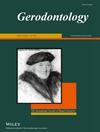This systematic review aimed to provide an overview of the most recent evidence on the association between measured masticatory function and cognitive status.
Literature and manual searches were conducted using three electronic databases (PubMed, Web of Science and CINAHL). Observational studies published between 2011 and 2021 investigating the association between masticatory function, dementia and cognitive status in adult humans were abstracted and reviewed by three reviewers. Studies that assessed participants' masticatory function using objective and subjective measurements and that individually examined its association with cognitive function were included. The included studies were divided into cross-sectional and cohort studies, and the quality of each study was analysed using critical appraisal skills checklists. Additionally, the main conclusions and strength of the evidence were assessed for each article.
A total of 21 studies (11 cross-sectional studies that objectively evaluated masticatory function, 9 cross-sectional studies that subjectively evaluated masticatory function and 1 prospective cohort study) were evaluated. The poorer masticatory function was associated with lower cognitive status even after adjusting for potential risk factors of dementia in four of 11 and six of nine cross-sectional studies where the masticatory function was respectively evaluated objectively and subjectively. One prospective cohort study also demonstrated that masticatory function, as evaluated based on measurements of occlusal force, predicted cognitive decline during the follow-up period.
Several studies demonstrated a positive association between masticatory function and cognitive status. However, further studies, particularly longitudinal studies, are required to determine whether the association is causal.


